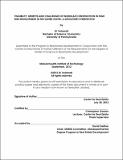Feasibility, benefits and challenges of modular construction in high rise development in the United States : a developer's perspective
Author(s)
Velamati, Sri
DownloadFull printable version (1.554Mb)
Other Contributors
Massachusetts Institute of Technology. Center for Real Estate. Program in Real Estate Development.
Advisor
Christopher Gordon.
Terms of use
Metadata
Show full item recordAbstract
Modular construction has long been utilized in the construction of residential and many other commercial product types as a means for potentially quicker construction delivery times. Over the past 5 years this construction technique has slowly been introduced into the high rise residential market throughout the world. The additional structural challenges of high rise construction make modular construction in this setting more challenging, but the high construction costs of high rise construction also make any savings in time and hard cost worth consideration. Based on case studies, interviews and financial simulations this thesis will address the design, engineering, sustainability, scheduling, legal and financial considerations a developer would likely consider in adopting modular construction in a high rise project in the United States.
Description
Thesis (S.M. in Real Estate Development)--Massachusetts Institute of Technology, Program in Real Estate Development in Conjunction with the Center for Real Estate, 2012. Cataloged from department-submitted PDF version of thesis. This electronic version was submitted and approved by the author's academic department as part of an electronic thesis pilot project. The certified thesis is available in the Institute Archives and Special Collections. Includes bibliographical references (p. 101-102).
Date issued
2012Department
Massachusetts Institute of Technology. Center for Real Estate. Program in Real Estate Development.; Massachusetts Institute of Technology. Center for Real EstatePublisher
Massachusetts Institute of Technology
Keywords
Center for Real Estate. Program in Real Estate Development.